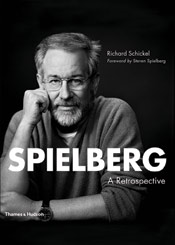(Sterling, 280 pages, $35 )
By Richard Schickel
The ability to suspend disbelief has always been the hallmark of Steven Spielberg's work. For the last 40 years, he has captivated the world with films of heart, hope and dazzling technical prowess. Film historian and documentary director Richard Schickel captures the magic of this modern day Melies in Steven Spielberg: A Retrospective, an intimate appraisal of the films that made the man an icon.
 This lushly illustrated coffee table volume is a visual treat befitting the work of one of the most visual storytellers of our time. It is not a biography, in the technical sense, and as Spielberg says in the forward, he and Schickel were not attempting to create a 'definitive' study of his work. It is, instead, a personal look back at each film in Spielberg's canon.
This lushly illustrated coffee table volume is a visual treat befitting the work of one of the most visual storytellers of our time. It is not a biography, in the technical sense, and as Spielberg says in the forward, he and Schickel were not attempting to create a 'definitive' study of his work. It is, instead, a personal look back at each film in Spielberg's canon.
Spielberg's popularity can sometimes overshadow his skill and virtuosity as a filmmaker, and Schickel writes that "If this book has a theme, it is that Spielberg's success hides his seriousness of purpose. Each chapter offers a compelling pictorial as well as Schickel's analysis and anecdotes culled from years of conversations with the director. The book examines the legendary successes: the nightmare production of Jaws; the poetic depth of Close Encounters of the Third Kind, Spielberg's dream of a film; E.T., which, for all of its soaring visual magic, is rooted in humanity and simplicity. Spielberg is also open and candid about his less successful films, admitting his obsessive perfectionism and costly fussing on 1941, and the disappointment of the sweet but miscalculated Hook, which he is only now coming to terms with.
Schickel suggests the secret to Spielberg's staying power is in his range; a rainbow of genres, moods and messages. He is responsible for some of the most escapist (and profitable) of film franchises; Indiana Jones and Jurassic Park, the latter seismically shifting the way effects films were made, and how audiences look at them. Schickel makes the point that 20 years after the first Jurassic Park, today's affects may be bigger and louder; but are they really any better?
Spielberg is obviously at a stage in his career where he has nothing left to prove to anyone, except himself. So when Schickel even hints at the possibility of ever slowing down, Spielberg is incredulous at the very notion. He says, "Why would anyone stop doing this?"
Review written by Carley Johnson.